Business Law Assignment - Enterprise Law, Autumn 2019
VerifiedAdded on 2023/01/19
|6
|1251
|40
Homework Assignment
AI Summary
This document presents a comprehensive solution to a business law assignment, addressing several key legal issues. The assignment begins by examining whether a refusal to sell a book constitutes a breach of contract, analyzing the concepts of invitation to treat and offer. It then delves into contract formation, specifically focusing on the postal rule and the validity of acceptance and revocation. The assignment also explores the doctrine of promissory estoppel in the context of part payment and its implications on debt settlement. Finally, it considers the intention to create legal relations in agreements between family members, referencing relevant case law such as Adams v Lindsell, Henthorn v Fraser, and Pinnel's case to support its arguments. The solution provides a detailed analysis of each issue, applying legal principles to the given scenarios and arriving at well-reasoned conclusions.
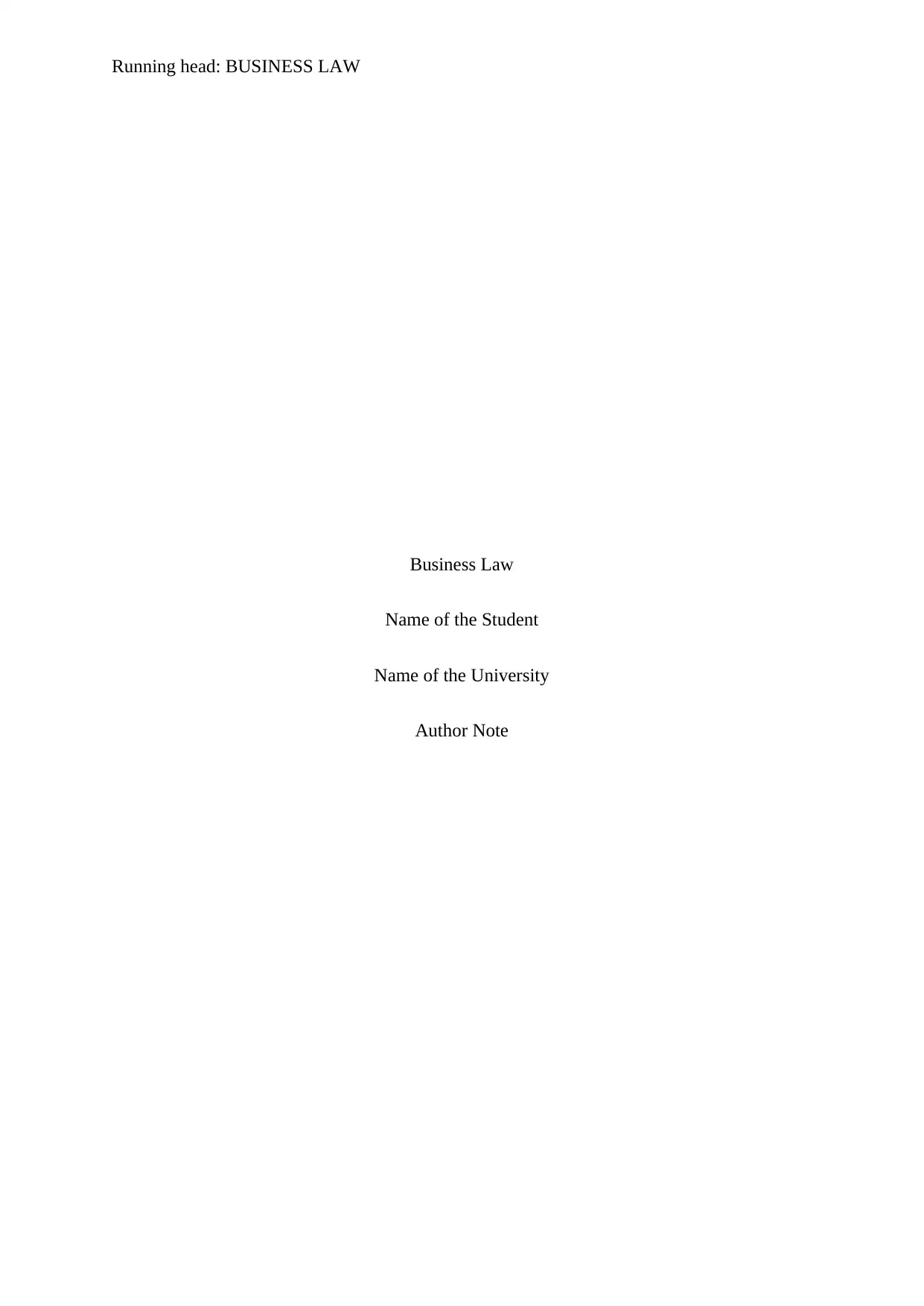
Running head: BUSINESS LAW
Business Law
Name of the Student
Name of the University
Author Note
Business Law
Name of the Student
Name of the University
Author Note
Paraphrase This Document
Need a fresh take? Get an instant paraphrase of this document with our AI Paraphraser
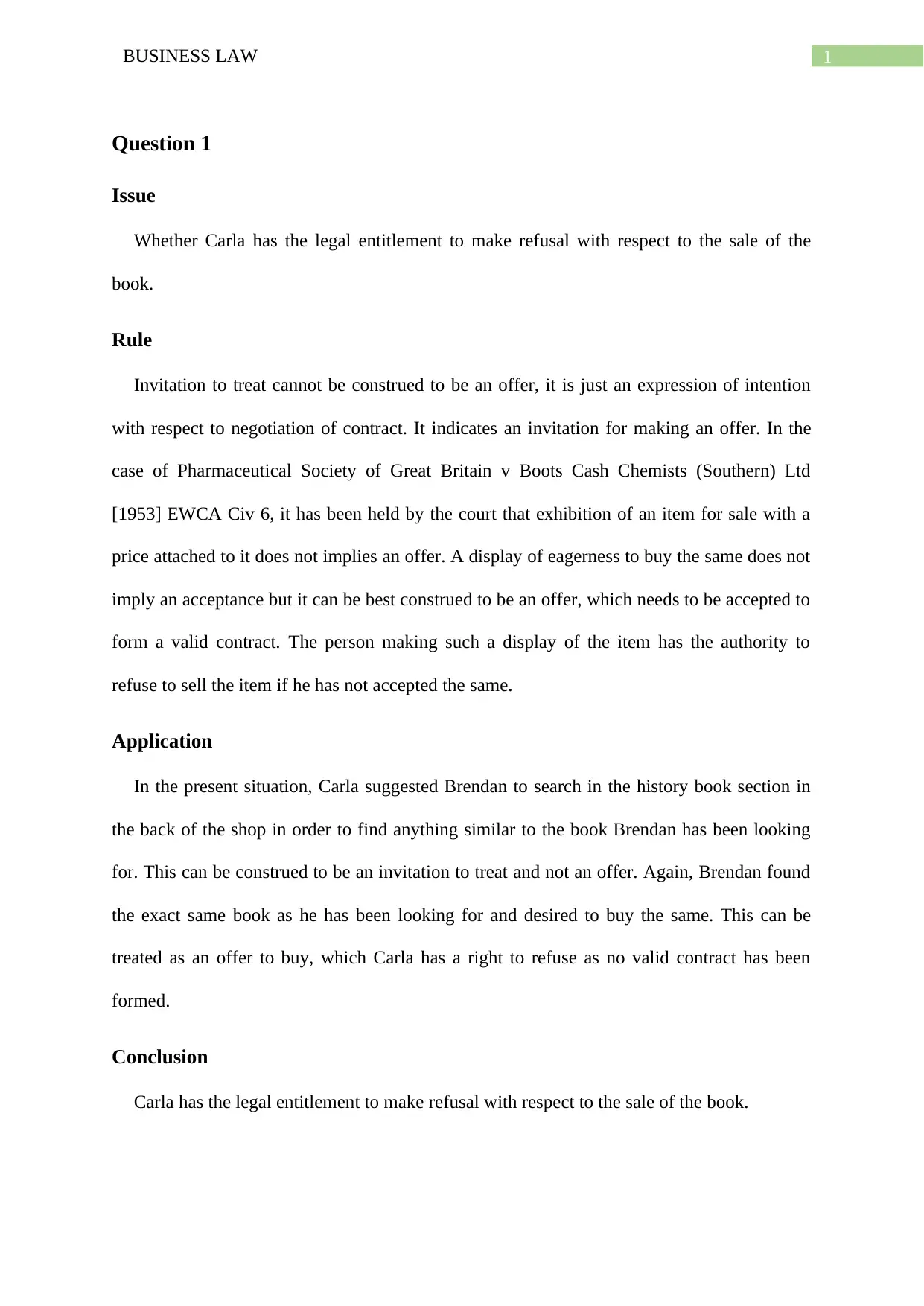
1BUSINESS LAW
Question 1
Issue
Whether Carla has the legal entitlement to make refusal with respect to the sale of the
book.
Rule
Invitation to treat cannot be construed to be an offer, it is just an expression of intention
with respect to negotiation of contract. It indicates an invitation for making an offer. In the
case of Pharmaceutical Society of Great Britain v Boots Cash Chemists (Southern) Ltd
[1953] EWCA Civ 6, it has been held by the court that exhibition of an item for sale with a
price attached to it does not implies an offer. A display of eagerness to buy the same does not
imply an acceptance but it can be best construed to be an offer, which needs to be accepted to
form a valid contract. The person making such a display of the item has the authority to
refuse to sell the item if he has not accepted the same.
Application
In the present situation, Carla suggested Brendan to search in the history book section in
the back of the shop in order to find anything similar to the book Brendan has been looking
for. This can be construed to be an invitation to treat and not an offer. Again, Brendan found
the exact same book as he has been looking for and desired to buy the same. This can be
treated as an offer to buy, which Carla has a right to refuse as no valid contract has been
formed.
Conclusion
Carla has the legal entitlement to make refusal with respect to the sale of the book.
Question 1
Issue
Whether Carla has the legal entitlement to make refusal with respect to the sale of the
book.
Rule
Invitation to treat cannot be construed to be an offer, it is just an expression of intention
with respect to negotiation of contract. It indicates an invitation for making an offer. In the
case of Pharmaceutical Society of Great Britain v Boots Cash Chemists (Southern) Ltd
[1953] EWCA Civ 6, it has been held by the court that exhibition of an item for sale with a
price attached to it does not implies an offer. A display of eagerness to buy the same does not
imply an acceptance but it can be best construed to be an offer, which needs to be accepted to
form a valid contract. The person making such a display of the item has the authority to
refuse to sell the item if he has not accepted the same.
Application
In the present situation, Carla suggested Brendan to search in the history book section in
the back of the shop in order to find anything similar to the book Brendan has been looking
for. This can be construed to be an invitation to treat and not an offer. Again, Brendan found
the exact same book as he has been looking for and desired to buy the same. This can be
treated as an offer to buy, which Carla has a right to refuse as no valid contract has been
formed.
Conclusion
Carla has the legal entitlement to make refusal with respect to the sale of the book.
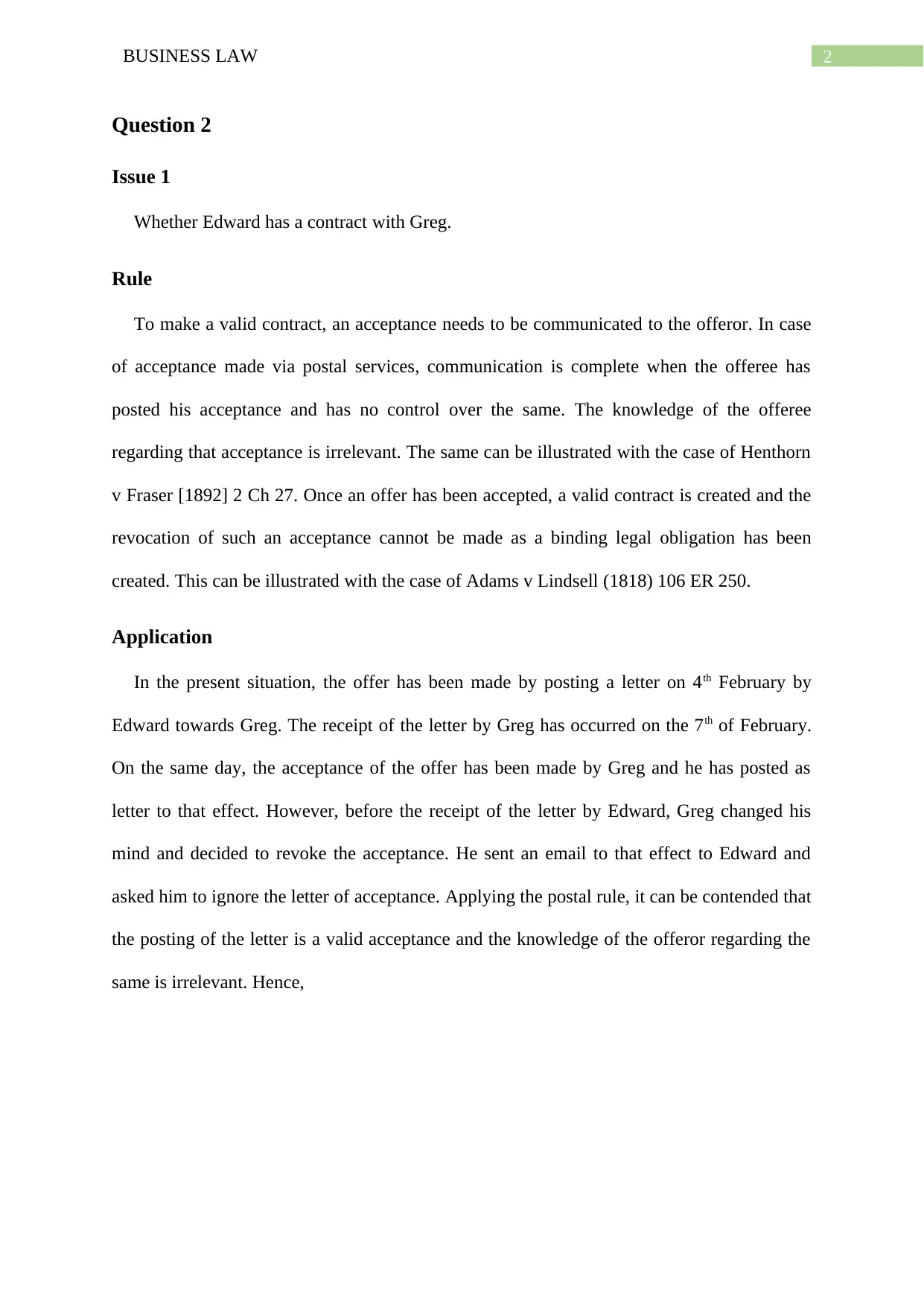
2BUSINESS LAW
Question 2
Issue 1
Whether Edward has a contract with Greg.
Rule
To make a valid contract, an acceptance needs to be communicated to the offeror. In case
of acceptance made via postal services, communication is complete when the offeree has
posted his acceptance and has no control over the same. The knowledge of the offeree
regarding that acceptance is irrelevant. The same can be illustrated with the case of Henthorn
v Fraser [1892] 2 Ch 27. Once an offer has been accepted, a valid contract is created and the
revocation of such an acceptance cannot be made as a binding legal obligation has been
created. This can be illustrated with the case of Adams v Lindsell (1818) 106 ER 250.
Application
In the present situation, the offer has been made by posting a letter on 4th February by
Edward towards Greg. The receipt of the letter by Greg has occurred on the 7th of February.
On the same day, the acceptance of the offer has been made by Greg and he has posted as
letter to that effect. However, before the receipt of the letter by Edward, Greg changed his
mind and decided to revoke the acceptance. He sent an email to that effect to Edward and
asked him to ignore the letter of acceptance. Applying the postal rule, it can be contended that
the posting of the letter is a valid acceptance and the knowledge of the offeror regarding the
same is irrelevant. Hence,
Question 2
Issue 1
Whether Edward has a contract with Greg.
Rule
To make a valid contract, an acceptance needs to be communicated to the offeror. In case
of acceptance made via postal services, communication is complete when the offeree has
posted his acceptance and has no control over the same. The knowledge of the offeree
regarding that acceptance is irrelevant. The same can be illustrated with the case of Henthorn
v Fraser [1892] 2 Ch 27. Once an offer has been accepted, a valid contract is created and the
revocation of such an acceptance cannot be made as a binding legal obligation has been
created. This can be illustrated with the case of Adams v Lindsell (1818) 106 ER 250.
Application
In the present situation, the offer has been made by posting a letter on 4th February by
Edward towards Greg. The receipt of the letter by Greg has occurred on the 7th of February.
On the same day, the acceptance of the offer has been made by Greg and he has posted as
letter to that effect. However, before the receipt of the letter by Edward, Greg changed his
mind and decided to revoke the acceptance. He sent an email to that effect to Edward and
asked him to ignore the letter of acceptance. Applying the postal rule, it can be contended that
the posting of the letter is a valid acceptance and the knowledge of the offeror regarding the
same is irrelevant. Hence,
⊘ This is a preview!⊘
Do you want full access?
Subscribe today to unlock all pages.

Trusted by 1+ million students worldwide
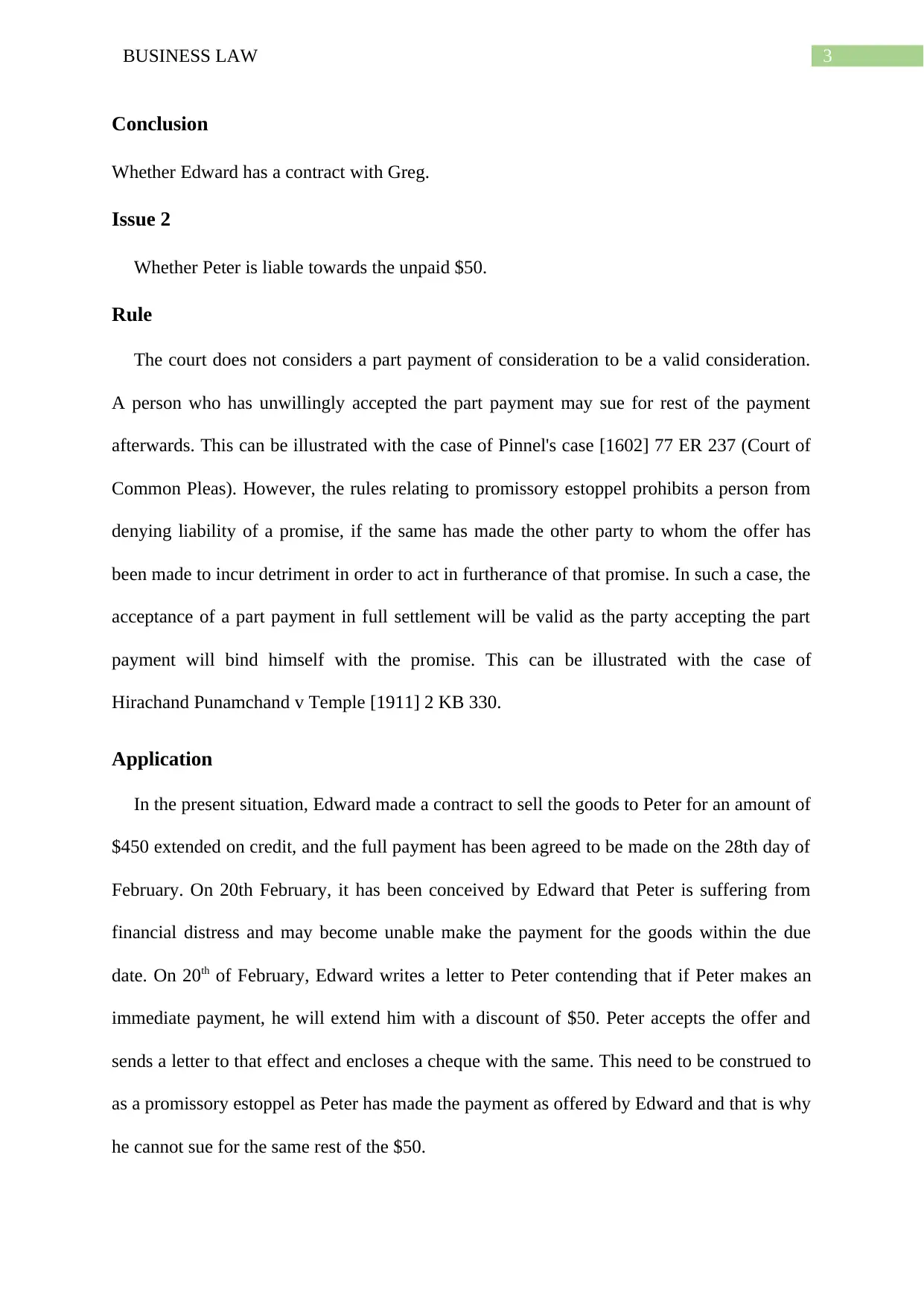
3BUSINESS LAW
Conclusion
Whether Edward has a contract with Greg.
Issue 2
Whether Peter is liable towards the unpaid $50.
Rule
The court does not considers a part payment of consideration to be a valid consideration.
A person who has unwillingly accepted the part payment may sue for rest of the payment
afterwards. This can be illustrated with the case of Pinnel's case [1602] 77 ER 237 (Court of
Common Pleas). However, the rules relating to promissory estoppel prohibits a person from
denying liability of a promise, if the same has made the other party to whom the offer has
been made to incur detriment in order to act in furtherance of that promise. In such a case, the
acceptance of a part payment in full settlement will be valid as the party accepting the part
payment will bind himself with the promise. This can be illustrated with the case of
Hirachand Punamchand v Temple [1911] 2 KB 330.
Application
In the present situation, Edward made a contract to sell the goods to Peter for an amount of
$450 extended on credit, and the full payment has been agreed to be made on the 28th day of
February. On 20th February, it has been conceived by Edward that Peter is suffering from
financial distress and may become unable make the payment for the goods within the due
date. On 20th of February, Edward writes a letter to Peter contending that if Peter makes an
immediate payment, he will extend him with a discount of $50. Peter accepts the offer and
sends a letter to that effect and encloses a cheque with the same. This need to be construed to
as a promissory estoppel as Peter has made the payment as offered by Edward and that is why
he cannot sue for the same rest of the $50.
Conclusion
Whether Edward has a contract with Greg.
Issue 2
Whether Peter is liable towards the unpaid $50.
Rule
The court does not considers a part payment of consideration to be a valid consideration.
A person who has unwillingly accepted the part payment may sue for rest of the payment
afterwards. This can be illustrated with the case of Pinnel's case [1602] 77 ER 237 (Court of
Common Pleas). However, the rules relating to promissory estoppel prohibits a person from
denying liability of a promise, if the same has made the other party to whom the offer has
been made to incur detriment in order to act in furtherance of that promise. In such a case, the
acceptance of a part payment in full settlement will be valid as the party accepting the part
payment will bind himself with the promise. This can be illustrated with the case of
Hirachand Punamchand v Temple [1911] 2 KB 330.
Application
In the present situation, Edward made a contract to sell the goods to Peter for an amount of
$450 extended on credit, and the full payment has been agreed to be made on the 28th day of
February. On 20th February, it has been conceived by Edward that Peter is suffering from
financial distress and may become unable make the payment for the goods within the due
date. On 20th of February, Edward writes a letter to Peter contending that if Peter makes an
immediate payment, he will extend him with a discount of $50. Peter accepts the offer and
sends a letter to that effect and encloses a cheque with the same. This need to be construed to
as a promissory estoppel as Peter has made the payment as offered by Edward and that is why
he cannot sue for the same rest of the $50.
Paraphrase This Document
Need a fresh take? Get an instant paraphrase of this document with our AI Paraphraser
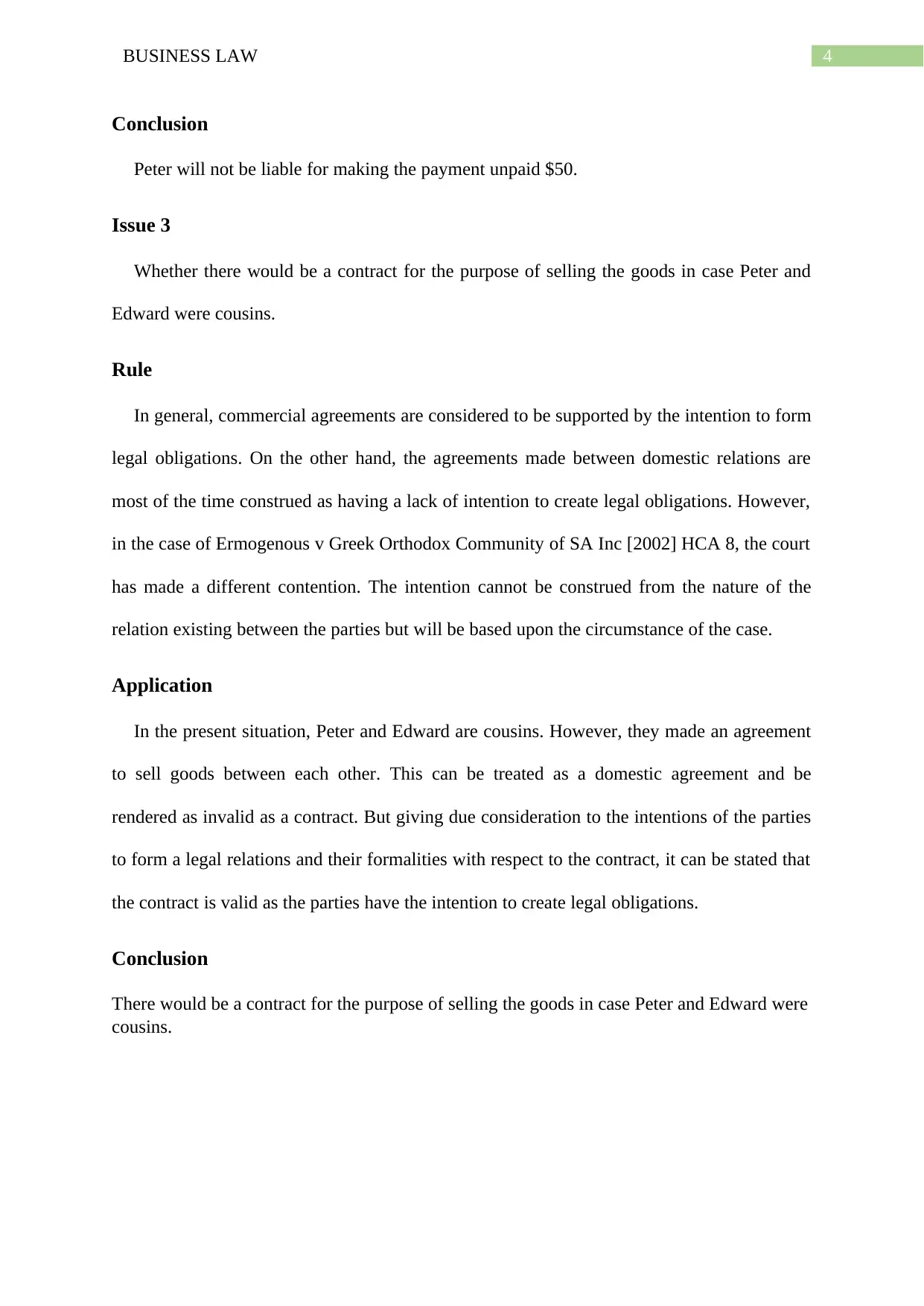
4BUSINESS LAW
Conclusion
Peter will not be liable for making the payment unpaid $50.
Issue 3
Whether there would be a contract for the purpose of selling the goods in case Peter and
Edward were cousins.
Rule
In general, commercial agreements are considered to be supported by the intention to form
legal obligations. On the other hand, the agreements made between domestic relations are
most of the time construed as having a lack of intention to create legal obligations. However,
in the case of Ermogenous v Greek Orthodox Community of SA Inc [2002] HCA 8, the court
has made a different contention. The intention cannot be construed from the nature of the
relation existing between the parties but will be based upon the circumstance of the case.
Application
In the present situation, Peter and Edward are cousins. However, they made an agreement
to sell goods between each other. This can be treated as a domestic agreement and be
rendered as invalid as a contract. But giving due consideration to the intentions of the parties
to form a legal relations and their formalities with respect to the contract, it can be stated that
the contract is valid as the parties have the intention to create legal obligations.
Conclusion
There would be a contract for the purpose of selling the goods in case Peter and Edward were
cousins.
Conclusion
Peter will not be liable for making the payment unpaid $50.
Issue 3
Whether there would be a contract for the purpose of selling the goods in case Peter and
Edward were cousins.
Rule
In general, commercial agreements are considered to be supported by the intention to form
legal obligations. On the other hand, the agreements made between domestic relations are
most of the time construed as having a lack of intention to create legal obligations. However,
in the case of Ermogenous v Greek Orthodox Community of SA Inc [2002] HCA 8, the court
has made a different contention. The intention cannot be construed from the nature of the
relation existing between the parties but will be based upon the circumstance of the case.
Application
In the present situation, Peter and Edward are cousins. However, they made an agreement
to sell goods between each other. This can be treated as a domestic agreement and be
rendered as invalid as a contract. But giving due consideration to the intentions of the parties
to form a legal relations and their formalities with respect to the contract, it can be stated that
the contract is valid as the parties have the intention to create legal obligations.
Conclusion
There would be a contract for the purpose of selling the goods in case Peter and Edward were
cousins.
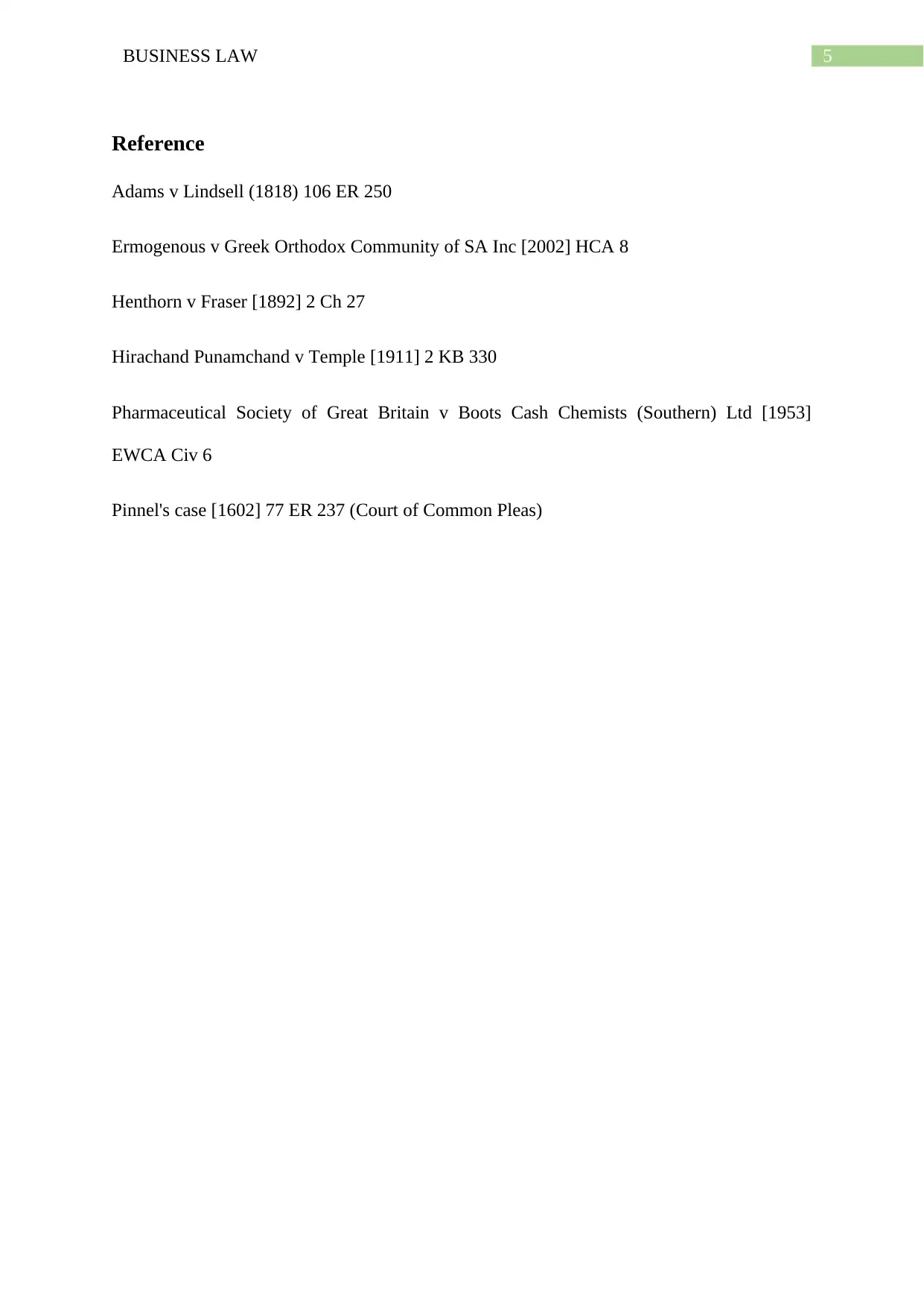
5BUSINESS LAW
Reference
Adams v Lindsell (1818) 106 ER 250
Ermogenous v Greek Orthodox Community of SA Inc [2002] HCA 8
Henthorn v Fraser [1892] 2 Ch 27
Hirachand Punamchand v Temple [1911] 2 KB 330
Pharmaceutical Society of Great Britain v Boots Cash Chemists (Southern) Ltd [1953]
EWCA Civ 6
Pinnel's case [1602] 77 ER 237 (Court of Common Pleas)
Reference
Adams v Lindsell (1818) 106 ER 250
Ermogenous v Greek Orthodox Community of SA Inc [2002] HCA 8
Henthorn v Fraser [1892] 2 Ch 27
Hirachand Punamchand v Temple [1911] 2 KB 330
Pharmaceutical Society of Great Britain v Boots Cash Chemists (Southern) Ltd [1953]
EWCA Civ 6
Pinnel's case [1602] 77 ER 237 (Court of Common Pleas)
⊘ This is a preview!⊘
Do you want full access?
Subscribe today to unlock all pages.

Trusted by 1+ million students worldwide
1 out of 6
Related Documents
Your All-in-One AI-Powered Toolkit for Academic Success.
+13062052269
info@desklib.com
Available 24*7 on WhatsApp / Email
![[object Object]](/_next/static/media/star-bottom.7253800d.svg)
Unlock your academic potential
Copyright © 2020–2026 A2Z Services. All Rights Reserved. Developed and managed by ZUCOL.





